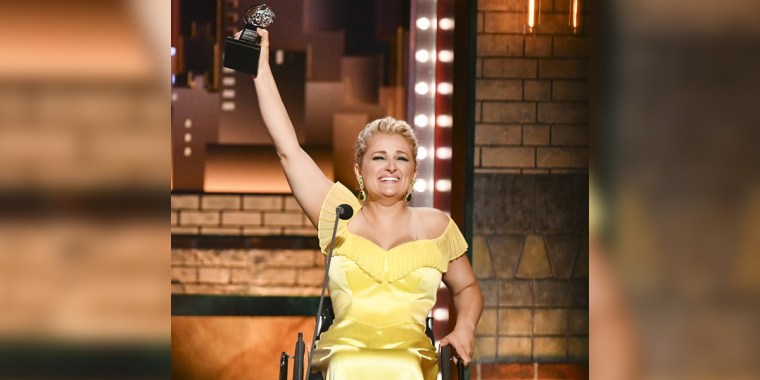Ali Stroker made history last month when she became the first actor who uses a wheelchair to win a Tony Award for her Broadway performance in ““Rodgers and Hammerstein’s Oklahoma!” And now she’s using her platform to advocate for disability rights and inspire young people to realize that there are no limits to their dreams.
“You are going to hit challenges,” Stroker, 32, told “Morning Joe” co-hosts Mika Brzezinski and Willie Geist during an interview in advance of Friday's 29th anniversary of the Americans with Disabilities Act, a federal law that protects access for all disabled people. “...A lot of times we can focus on the challenges, but there are a lot of opportunities for you and opportunities waiting to be created by you.”
Stroker, who has been using a wheelchair since the age of two following a car accident, shared other pearls of wisdom she’s learned throughout her journey and how performing has helped liberate her.
Find your passion to boost confidence.
For Stroker, the theater was always a deeply personal outlet. It’s also how she found her inner confidence.
“I was used to people coming up to me, people staring, and when I got on stage it felt like I was able to feel powerful in that position when people were looking at me,” Stroker said. “And so that gave me confidence.”
Singing is especially liberating for Stroker.
“Some people go out for a morning jog … I like to sing a song at the top of my range. For me, that’s exhilarating. It raises my endorphins,” said Stroker. “It makes me feel so good. This career has given me an opportunity not just to achieve my goals but also to heal and become the best version of myself.”
Lean on your circle.
Stroker said her family always believed in her, which is a huge source of her confidence and ultimately, her success.
“I get my confidence from my home team and from the people I surround myself with,” she said. “My partner David, my parents, my brother, my sister and all of my friends — those are the people who remind me of who I really am.”
Advocate for access.
Despite Stroker’s success, and in spite of the ADA, people will disabilities face barriers on a regular basis, she said. Access and independence are paramount in Stroker’s fight for people with disabilities.
“I’ll arrive at a restaurant that I’m dying to try, and then it has one stair,” she said. “When those accommodations are there, I am able to feel my full freedom as a woman, a New Yorker and as an American … Accessibility is essential when it comes to equal opportunities because someone can offer you a job, but if you can’t literally get into the door or get on that stage, it doesn’t matter what someone wants.”
Pave the way for future generations.
As a Broadway star, Stroker has a stage, and she uses it not only to promote her own career, but to pave the way for other people with disabilities.
“I remember what it was like as a kid going to see Broadway shows and looking and asking: ‘is there anyone up there with physical challenges?’” she recalled. “Representation is so powerful for young people ... Eight shows a week is really demanding, but to know that there are young people out there looking to me and becoming inspired and motivated to achieve their dreams — to me that’s a part of this entire experience.”
